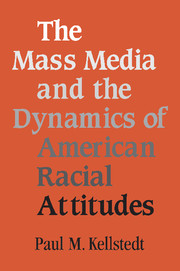Book contents
- Frontmatter
- Contents
- List of Figures
- List of Tables
- Preface
- The Mass Media and the Dynamics of American Racial Attitudes
- 1 Toward a Dynamic Perspective on Racial Attitudes
- 2 Eras of Media Coverage of Race
- 3 Eras of Racial Liberalism and Conservatism
- 4 Media Framing and the Dynamics of Racial Policy Preferences
- 5 The Fusion of Race and the Welfare State in the Public Mind
- 6 A New American Dilemma for a New Millennium?
- Appendix
- References
- Index
6 - A New American Dilemma for a New Millennium?
Published online by Cambridge University Press: 06 January 2010
- Frontmatter
- Contents
- List of Figures
- List of Tables
- Preface
- The Mass Media and the Dynamics of American Racial Attitudes
- 1 Toward a Dynamic Perspective on Racial Attitudes
- 2 Eras of Media Coverage of Race
- 3 Eras of Racial Liberalism and Conservatism
- 4 Media Framing and the Dynamics of Racial Policy Preferences
- 5 The Fusion of Race and the Welfare State in the Public Mind
- 6 A New American Dilemma for a New Millennium?
- Appendix
- References
- Index
Summary
The latent causes of faction are thus sown in the nature of man; and we see them every where brought into different degrees of activity, according to the different circumstances of civil society.
– James Madison, The Federalist Papers, Number 10My analysis, like all others, leaves several questions unanswered. Although we have uncovered much about the causes of the ebbs and flows of racial policy preferences, we have not begun to explore the consequences of these shifts. To turn our key dependent variable into an independent variable, we can ask: Do these shifts in public opinion on race have policy consequences? Do they have electoral consequences, affecting the fortunes of candidates for public office? If they affect policy, how do they do it? Do they affect various types of racial policy, like antidiscrimination enforcement or affirmative action, or (and?) do they affect broader policies like welfare and the government's redistributive posture?
The answer to some of the above questions, presumably, is yes, though there is no evidence for it in this book. Perhaps I say “presumably” out of a sense of hope or optimism that our policy-making system is at least partly a function of inputs from public opinion. Or perhaps I say it out of fear that, if opinion has no effects, we have studied the causes of something that is itself impotent. Probably both.
The questions I have raised here strike me as important.
- Type
- Chapter
- Information
- The Mass Media and the Dynamics of American Racial Attitudes , pp. 130 - 141Publisher: Cambridge University PressPrint publication year: 2003



